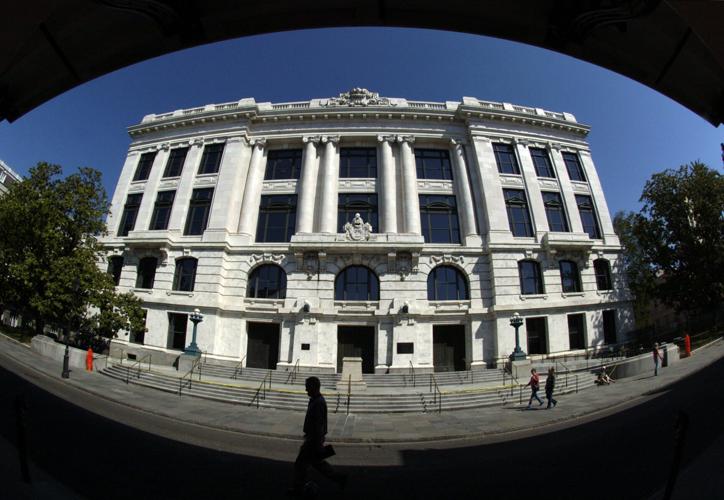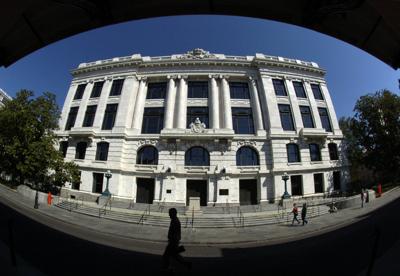Three Democratic hopefuls are vying to become the second Black justice on the Louisiana Supreme Court, representing a newly re-carved district in November.
First Circuit Court of Appeal Chief Judge John Michael Guidry will battle Second Circuit appellate judge Marcus Hunter and Leslie Ricard Chambers, a policy advisor to former Gov. Jon Bel Edwards.
All three are graduates of the Southern University Law Center.
It’s a monumental race poised to add an African American judge to the seven seats on the state’s court of authority.
State lawmakers reapportioned the high court's judicial boundaries during this year’s legislative session to create a second majority-Black voting district. It was the first time Louisiana revamped its Supreme Court map since 1997, when a federal court order forced lawmakers to carve out the state’s first majority-minority district in Orleans Parish. Justice Piper Griffin currently holds that seat on the state Supreme Court; her term ends in 2030.
Gov. Jeff Landry and Attorney General Liz Murrill both supported the legislation this year, which came on the heels of a settlement in a federal lawsuit the NAACP and other civil rights advocates filed against the Secretary of State in 2019. The lawsuit noted that there have only been three Black justices in the state since Louisiana voters began electing their state Supreme Court judges in 1904. Advocates claimed the district lines allowed for “racially polarized voting” that diluted Black voting power and sought to redraw of the court’s voting map to allow for more adequate representation on the bench for the state’s largest minority group. Black Louisianians make up nearly a third of the state population.

A new Supreme Court map that would be enacted if the Louisiana Legislature passes House Bill 22.
The court's freshly drawn district is anchored in Baton Rouge and extends up the Mississippi River to Monroe, covering the entirety of 13 other parishes on the state's northeast elbow along the way. The district, which also includes portions of Rapides, Tangipahoa and Ouachita parishes, boasts a voting population that’s 55% Black. Guidry, Hunter and Ricard Chambers were the three who entered the field by the time qualifying for the seat ended Friday along with races in the state’s other Nov. 5 primary runs, according to the Louisiana Secretary of State's website.
The November primary is nonpartisan, although all three Supreme Court candidates are Democrats. If nobody in the race tallies more than 50% of the ballots cast, the top two vote getters will battle in a winner-take-all Dec. 7 runoff. Early voting begins Oct. 18.
Here's what you need to know about the three hopefuls who qualified for the District 2 Supreme Court seat:
John Michael Guidry

John Michael Guidry, chief judge of the First Circuit Court of Appeal
Guidry, 62, is the most seasoned candidate in the race. He ran for Supreme Court in 2012 but fell short, losing to Justice Jefferson Hughes.
Plaintiffs in the 2019 federal lawsuit cited Guidry's prior run a prime example of a more-qualified Black candidate being unable to overcome "racial appeals" in predominantly White voting districts. Despite being the top vote getter amongst eight candidates in the 2012 primary, Guidry lost to Hughes by about 5 1/2 percentage points in a head-to-head battle less than five weeks later.
That race was for a seat in a Supreme Court district where, according to Secretary of State statistics, nearly 63% of the qualified voters were White at the time.
This time around, Guidry's already been endorsed by the Louisiana Association of Business and Industry, the state’s largest business organization, along with political action committees for other labor organizations. LABI called him a “conscientious jurist” with a history of rulings that support free market and fair enterprise in Louisiana.
The East Baton Rouge native is currently in the midst of his third full term as First Circuit Court of Appeal judge, a position he’s held since 1997. Over that span, Guidry has authored more than 1,800 judicial opinions, reviewed another 3,600 cases and estimated he’s handled thousands more appeal writs. Since 1988, Guidry’s worked as an adjunct professor at the Southern University Law Center. He likened his experience to that of a specialized heart surgeon as opposed to two-year resident doctor.
“When you are dealing with life, liberty and property, you’re dealing with people’s lives,” he said. “So what people want is the most qualified, experienced judge handling their cases.”
Guidry represents the lone African American on the First Circuit bench, elected from the only majority-Black district on the appeals court’s voting map. There are 11 other judges in the circuit.
In January 2023, Guidry became the first Black chief judge sworn in to lead the Capital City-based court in its nearly 120-year history.
Guidry’s political career spans more than 30 years. He was elected to the House of Representatives in 1991 and became a state senator for East Baton Rouge two years later.
“I’m extremely excited. This is an opportunity to bring my 26-plus years of experience to the Supreme Court,” Guidry said Friday. “I have taught the law for over 35 years at the law school. I have made the law as a member of the state House of Representatives and the State Senate. And I have interpreted the law for now 26-plus years. I think that qualifies me uniquely to serve on our state’s highest appellate court.”
Marcus Hunter

Marcus Hunter, Second Circuit Court of Appeal judge
Marcus Hunter, 45, mounts his candidacy from the northern corners of the district and brings with him a lineage of lawyers and lawmakers. His father, Willie Hunter Jr., was a state representative in Monroe for 16 years and served as chairman of the state’s Legislative Black Caucus. His brother, Daniel, is an attorney in Monroe. The father and two sons worked together in a family law firm, where a young Marcus Hunter began his legal career. He went on to become a staff attorney for North Louisiana Legal Services, doing pro bono work for civil litigants across the state.
Hunter’s background also includes time in the Legislature as well as the judiciary. He assumed his seat on the Second Circuit Court of Appeal, which is based in Shreveport, in May 2021.
Before that, Hunter spent nearly three years as a state judge in the 4th Judicial District, handling cases in Ouachita and Morehouse parishes.
He began presiding over dockets after he served a term and a half crafting bills as a State House representative for Monroe. Prior to becoming a lawmaker, Hunter earned his stripes when he spent three years as a public defender in Bossier, Caddo and Ouachita parishes.
As a Louisiana legislator, Hunter sued the Secretary of State to increase the number of early voting days in the 2014 election. He also helped push for cleaner water in St. Joseph Parish.
He acknowledged his predecessors for fighting in the early 1990s to paved a way for people like retired justice Bernette Joshua Johnson, who became the first Black judge on the Louisiana Supreme Court. He also thanked the current Legislature for adopting a new judicial map.
“My goal is to bring continued fairness and impartiality for all persons of this state – regardless of their background, regardless of their sexuality, regardless of their color and regardless of their socio-economic status,” he said. “This will not be a short-term thing for me. If people support me, I have the ability to provide a well-rounded, long term vision and impact on the Supreme Court. For decades to come, not a single term.”
Leslie Ricard Chambers

Leslie Ricard Chambers, Louisiana Housing Corporation's chief of staff
Ricard Chambers, 43, brings a unique skillset to the race that she said differentiates her from her opponents. She’s been a prosecutor, behind-the-scenes political strategist and policy advisor.
In April, she took over as the chief of staff for the Louisiana Housing Corporation, a Baton Rouge nonprofit that offers housing programs to low-to-moderate income renters and homebuyers.
Before joining the private sector, Ricard Chambers previously spent three years working as a chief administrative officer in Baton Rouge Mayor-President Sharon Weston Broome’s office. Between 2018 and 2022 she served on then-Gov. Bel Edward’s executive counsel team and was one of his criminal justice policy advisors.
Although she’s never donned the black robe, the St. Helena Parish native is no stranger to the litigation. She ran her own private law firm for nearly 13 years and was a prosecutor for 8 ½ years, handling cases for the East Baton Rouge District Attorney’s office. Ricard Chambers said she had to make critical judgement calls when deciding which cases to pursue and how to prosecute them, and to defend Bel Edwards’ reform efforts.
Ricard Chambers pointed to the spike in crime after the COVID-19 pandemic and the opioid crisis that swept Baton Rouge. She wants to help promote specialty court programs for substance abuse, domestic violence, mental health and hopes to partner with lower courts to add to the roster of specialized dockets that can address other issues plaguing the community.
“Over my years as a prosecutor, I saw how effective specialty courts can be and have been,” Ricard Chambers said. “I want to make a contribution to the rest of the justices either by expanding specialty court programs or seeing how we can make the best use of the ones we do have.”







